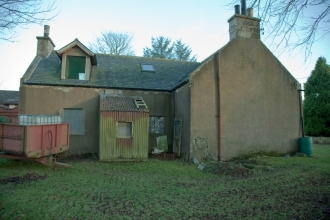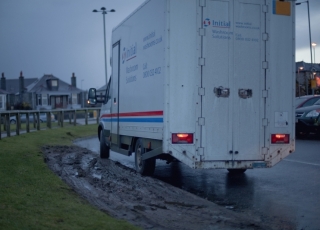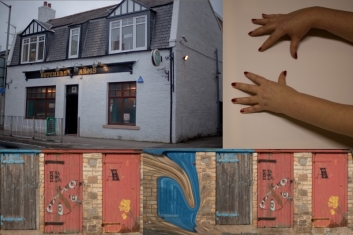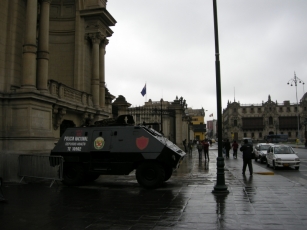Duncan Harley reflects on Life, the Universe and Everything. A sideways look at the world and its foibles.
The SS Politician – Whisky Galore
On the 4th of February 1941 during an Atlantic gale the SS Politician ran aground just off the Island of Eriskay in the Outer Hebrides.
The crew got ashore safely and the locals took them in and gave them shelter.
Now this was wartime and there was rationing of all sorts of items including eggs, butter and, somewhat crucially, whisky. When the folk of Eriskay learned from the crew of the “Polly” that the ship had 264,000 bottles of best highland malt in its hold, an unofficial salvage operation was launched.
Word soon spread all across the Hebrides and soon fishing boats were heading to fishing grounds all around the wreck during the hours of darkness to liberate the contents of the ship’s hold before the winter storms broke up the hull and destroyed the cargo forever. It was all quite innocent and seemingly legitimate.
But this was not the view of the local customs officer, one Charles McColl, who was incensed at the outright thievery that he saw going on. None of the whisky had paid a penny of duty and, as he railed against this loss to the public purse, McColl whipped up a furore and made the police act.
Villages were raided and crofts turned upside down. Bottles were hidden, secreted, or simply drunk in order to hide the evidence.
The rest is history.
The 1947 Compton Mackenzie novel Whisky Galore, which was made into an Ealing Comedy film in 1949, tells a good tale about the episode. In reality though, many islanders went to jail for up to six weeks for offences ranging from theft, to evasion of excise duty.
I can well understand the islander’s actions though. Faced with a gift from the sea of the water of life, known in the Gaelic as usquebaugh, what else were they to do?
In the course of that most severe of winters when the temperature plummeted to around minus 26 degrees
Many years ago when I lived in an Aberdeenshire village, I met in with a man by the name of Ronnie who lived in the croft house left to him by his mother who had been a seer. He had two brothers who were men of the cloth and he, Ronnie, had a special relationship with the water of life.
In the winter of 1981/82 I think it was, Ronnie, who was an affable sort of chap ran out of funds and took in some lodgers in order to keep body and spirit alive. In the course of that most severe of winters when the temperature plummeted to around minus 27 degrees in neighbouring Braemar, resulting in the deer foraging in the streets in desperation for sustenance, Ronnie was faced with a stark choice. Either heat the house or buy whisky.
Being a clever man he found a middle way. He burned the doors, floorboards and stairs for heating and using the income from his lodgers, bought whisky.
I drove past the scene today. The croft house is, somewhat surprisingly, still standing and looks just as it did all those years ago.
I have lost all contact with the man but wish him well.
Chelsea Tractors
One of the hazards of living in Aberdeenshire is the proliferation of those huge Chelsea Tractor vehicles which the oil rich buy and then attempt to use on the rural roads.
With names like Defender, Land Cruiser and Outlander they are often driven by diminutive men and women who only ever drive off road on the grass verge at my local Tesco’s car park.
Some of these monsters are so long and wide that the drivers really should sit a special driving test just to get to drive them round corners.
When met on a country road they often dominate the whole road and avoid the puddles lest they get mud on their vehicle of choice. We actually have a Humvee in my locality! I understand the owner lives in a flat in Inverurie and commutes to Dyce each day doing 55mph at a roaring 4mpg. The daily journey includes fuel stops every few miles and the occupants require a stepladder to get into the vehicle.
Don’t get me wrong though, these muscle cars have their place. I well remember a desert trip North of Cairo where a pal and I travelled off road for hours exploring Roman settlements and collecting Amphora. The North East of Scotland has both but most are well within reach of a well surfaced road.
This is a shot is of my local supermarket car park. The grass has been churned up by 4 X 4 enthusiasts who routinely park off road then proudly load shopping into the vehicles in the hope that they will somehow appear macho.
Seemingly the driver of a towel supply company has had quite enough. Taking direct citizen action he has used his van to block off the affected area.
I commend the drivers action and have photo shopped the van’s number plate to protect his/her identity.
The Butcher’s Arms
I find pubs fascinating.
Full of all sorts of humanity, they provide an insight into other folk’s lives which would be difficult to achieve by any other means.
You can walk in, do a bit of chat and walk right out again if you have met an axe murderer. Easy, no worries and a good kidney flush at the very least.
A decade or so ago, I frequented a pub in Glasgow populated by a quite varied spectrum including journalists, musicians, actors, students and Spanish Civil War veterans, plus a smattering of local manual labourers which completed the mix.
It all worked fairly well, at least up until 10pm on a Saturday night at which point it was best to make excuses and vacate the premises before the inevitable football rivalry came to the fore and the glasses began to fly.
I have often wondered in the intervening years why they sold wine by the pint. White Tornado it was called as I recall.
Glasgow also had a pub in Pollockshaws by the name of “The Office,” which was very handy indeed if you required an excuse for coming back late from work.
Then there was the Foundry Bar in Arbroath where I lived there for a while. A lovely place, by the seaside with an unheated open air pool and a sit in chipper where you had to use an old fashioned pre-metric penny to use the loo. Bingo on a Saturday night in the hall above Woolworth’s, boats in the harbour full of fish and a great big lighthouse flashing a few miles offshore just to keep you awake at night.
The town in those days had a mix of townsfolk, farm folk, fisher folk and Royal Marines. Each had their own public house and God help those who dared to mix and match. The local harbour still holds some dark secrets, I think.
The Foundry Bar however was different. Anyone could walk in providing they could sing, play a fiddle or simply enjoy the impromptu music. A brilliant place indeed!
No fights, no hassle and an old tea chest to sit on if you got there early enough.
There are some pubs, however, that I am not fond of. Not because they are bad pubs or difficult establishments though. Simply because of their names. I can cope quite happily with The Kintore Arms, The Black Bull, Filthy McNasties and even The Ploughman’s Lunch, as long as he has not eaten it already.
Sadly the Butcher’s Arms has never quite done it for me. Connotations of those Tesco’s horse burgers perhaps, or simply an uneasy relationship with raw, bloody, meat. I don’t really know for sure.
I often wonder if the management of this public house and the other 1200 similarly named establishments in the UK, would consider a name change to something like My Lovely Cow or even Aren’t Horses Great Ted? But that’s just a personal preference.
Full Metal Harry
We have heard a lot from the Royal Press correspondents in the last week or so about the third in line to the throne’s prowess with a machine gun, and I for one am certainly not about to get into a debate here except to state the obvious, which is of course that such guns are banned in the UK unless the powers that be can be convinced that citizens have a legitimate reason for possessing them.
The whole sorry tale somehow reminds me of an ex-soldier I saw interviewed a few years ago on a current affairs programme.
He was jobless, having left the army after several years of exemplary service. At his Jobcentre Plus interview he was asked about the skills he had learned during his time in the army.
“Well” he said – in a Geordie accent –
“I’m quite an ace with a machine gun and I can strip one down and reassemble it in the blink of an eye, so if you want someone killing, then I’m your man!”
Needless to say the Jobcentre staff struggled to find the ex squadie a job in his previous line of work.
So what would Harry need to do to get some target practice in, on the UK mainland?
He could join an Armed Response Unit I suppose, although self restraint and maturity are normally required to be taken on in such a role. Plus of course he would need to walk the beat as a uniformed bobby for a couple of years before even being considered for the job. Being sworn in, sworn at and spat upon on a typical Friday night down on Union Street may not be his scene though I suspect.
I am guessing that Royal Protection Duties would be also be out due to protocol issues.
He could of course provoke a riot. That would do it!
Far fetched?
the troops have returned home to discover that all is not well in Scotland
Not really, look at the Miners Strike, the 2011 London Riots which have been somewhat euphemistically called “England’s Summer of Disorder” and of course the numerous more recent examples in Eastern Europe and the Middle East where the ruling classes have fired upon the populace to make them see things their way.
In short, when the people are not happy with the governing classes, there may be trouble ahead.
The 31st of January is of course the anniversary of the Great Storms of 1953 which I wrote about last week. It’s also the date of the demise of the Young Pretender – Charles Edward Stuart – in Rome in 1788 after a protracted relationship with Brandy.
But who remembers the Battle of George Square which took place on the 31st January 1919?
Picture the scene if you will.
The “War to end all wars” has recently ended and the troops have returned home to discover that all is not well in Scotland. There are few jobs for the returning heroes and working conditions are poor with low wages and a long working week.
The workforce which had been in reserved occupations manufacturing the arms and tools for war are unhappy with the cuts in the standard working week due to the fact that the war has ended and there is no longer much demand in France for barbed wire, bullets and explosives.
Plus of course the Bolshevist revolution has taken place leading to the early demise of the Russian Royal Family by a firing squad.
So on Friday 31st January 1919, after a general strike by 40,000 workers in the industrial heartland of Scotland, there was a mass rally in Glasgow’s George Square. Now the aim of the rally was to hear the response of the UK government to the workers demands so the Lord Provost, Sir James Watson Stewart, and the Trades Council President, Mannie Shinwell, duly entered the City Chambers to have a wee natter.
Sadly things got out of control. As they talked, the police baton charged the assembled crowd. A magistrate tried to read the Riot Act but had the document taken from his hands and ripped up and things just got from bad to worse.
seasoned troops from south of the border were instructed to open fire if required to do so
The failure of the police to control the riot prompted the Coalition Government under one David Lloyd George to react. After Scottish Secretary Robert Munro described the riot as a “Bolshevist uprising” troops armed with machine guns, tanks and a howitzer arrived to occupy Glasgow’s streets.
The howitzer was positioned on the City Chambers steps facing the crowd, the local cattle market was transformed into a tank depot, machine guns were posted on the top of the North British Hotel, the Glasgow Stock Exchange and the General Post Office Buildings.
As is usual in such situations no local troops were used. The Scot’s battalions who had recently returned from France were confined in Maryhill Barracks while seasoned troops from south of the border were instructed to open fire if required to do so.
Amazingly, there was no major bloodshed as far as I am led to believe. There must have been broken heads and limbs via the initial police action but I can find no record of deaths.
The troops did not open fire although the tanks were deployed in Glasgow’s George Square. I can only assume that the government of the day decided that it would be a bad idea to provoke social change via bloodshed.
Mannie Shinwell and some other trade union activists were jailed for a bit and a 47 hour working week was agreed. Until the 1922 General Strike, things smouldered on of course, but that’s another story.
I have no information about what transpired in Aberdeen or Aberdeenshire on the 31st January 1919 and would ask folk to get in touch with any memories of that day. I did however find a reference to Aberdeen Trades Council discussing the issue and agreeing to mount a protest against the “continued imprisonment of the Clyde Strikers” and I have no doubt that given the politics of the time there must have been folk from the North East not only attending the demonstrations but serving with in the military in the area.
I sincerely hope that the third in line to the throne will not only read this but will have a wee look at the helicopter door gunner sequence in Stanley Kubrick’s Full Metal Jacket.
- Comments enabled – see comments box below. Note, all comments will be moderated.



